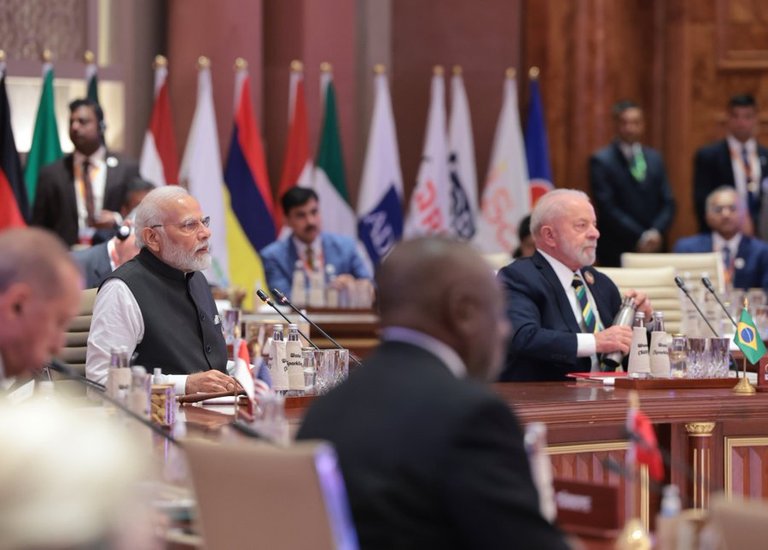
The global cryptocurrency landscape is about to undergo a seismic shift, as the heads of the 20 largest economies in the world, collectively known as the G20, have set their sights on implementing a groundbreaking cross-border framework for crypto assets. This initiative, known as the Crypto-Asset Reporting System (CARF), is poised to revolutionize the way countries exchange information about crypto transactions, and it's slated to go into effect starting in 2027.

The Urgency for Change
As the G20 leaders convene in New Delhi for a two-day summit, they have made it abundantly clear that there's an urgent need for the swift implementation of CARF, along with revisions to the Common Reporting Standard (CRS). In a consensus statement signed by G20 leaders, they call upon the Global Forum on Transparency and Exchange of Information for Tax Purposes to establish a well-defined timeline for information exchanges between relevant jurisdictions.
The Global Impact
The forthcoming CARF framework will have far-reaching implications, affecting several countries, including Argentina, Australia, Brazil, Canada, China, France, Germany, India, Indonesia, Italy, Japan, Mexico, Russia, Saudi Arabia, South Africa, South Korea, Turkey, the United Kingdom, the United States, and the European Union. In fact, approximately two-thirds of the world's population resides in a G20 member country.
A Transparent Future
The CARF initiative was initially introduced in October 2022 by the Organization for Economic Cooperation and Development (OECD). Its primary aim is to provide tax authorities with greater visibility into cryptocurrency transactions and the individuals behind them.
Under the proposed CARF system, countries will automatically exchange information on crypto transactions across borders annually. This exchange will encompass transactions occurring on unregulated cryptocurrency exchanges and wallet service providers.
Aligning with Global Standards
It's worth noting that cryptocurrency transactions are already subject to new disclosure regulations in many countries. For instance, in May, the European Union approved updated guidelines in line with CARF, outlining procedures for automatic data sharing among European government agencies for tax purposes. According to these new rules, the transfer of digital assets must be accompanied by the recipient's name, their distributed ledger address, and their ledger account number.
Strengthening Regulation
The G20 summit also embraced recommendations from the Financial Stability Board regarding the "supervision, regulation, and oversight of cryptocurrency activities and markets and global stablecoin arrangements." Published in July, these recommendations establish standards for stablecoins that are on par with those applied to traditional banks. Furthermore, they encourage regulators to prohibit any activities that hinder the identification of participants involved in cryptocurrency transactions, among other key suggestions.
~~~ embed:1700466345870262702/photo/1?ref_src=twsrc%5Etfw%7Ctwcamp%5Etweetembed%7Ctwterm%5E1700466345870262702%7Ctwgr%5Eef5b9e05a2ceadd365e513180ae646c8c792a40d%7Ctwcon%5Es1_&ref_url=https%3A%2F%2Fcointelegraph.com%2Fnews%2Fg20-moves-forward-international-crypto-framework twitter metadata:bmFyZW5kcmFtb2RpfHxodHRwczovL3R3aXR0ZXIuY29tL25hcmVuZHJhbW9kaS9zdGF0dXMvMTcwMDQ2NjM0NTg3MDI2MjcwMi9waG90by8xfA== ~~~
In conclusion, the G20's proactive approach to implementing the CARF framework and enhancing cryptocurrency regulation underscores the global significance of the crypto market. As we move closer to 2027, the world can expect a more transparent and accountable crypto ecosystem that aligns with international standards. This initiative will not only promote fiscal responsibility but also foster trust and stability within the ever-evolving cryptocurrency landscape.
Frequently Asked Questions
What is the CARF framework, and why is it important for the cryptocurrency industry?
The CARF framework, or Crypto-Asset Reporting System, is a cross-border initiative aimed at enhancing transparency in cryptocurrency transactions. It's crucial for the industry because it promotes accountability and helps tax authorities track crypto transactions more effectively.
Which countries will be impacted by the CARF framework?
Several countries, including G20 member states like the United States, China, Germany, and many others, will be affected by the CARF framework. In total, around two-thirds of the world's population resides in G20 countries.
How will the CARF framework affect cryptocurrency users and investors?
The CARF framework will require greater transparency in crypto transactions. Users and investors should expect increased reporting requirements and the automatic exchange of information between countries, which could impact their privacy and tax obligations.
What are stablecoins, and why are they being regulated like traditional banks?
Stablecoins are cryptocurrencies designed to have a stable value, often pegged to fiat currencies like the US dollar. They are being regulated like traditional banks to ensure they adhere to the same financial and security standards, promoting stability and consumer protection.
How can individuals stay compliant with the CARF framework and evolving crypto regulations?
To stay compliant, individuals should keep accurate records of their crypto transactions, including recipient information. It's also advisable to stay informed about the latest developments in crypto regulation in their respective jurisdictions.
For more information and updates on the evolving cryptocurrency landscape and Entertainment, please join us on discord. visit here.
Allows tax officials... Yeah that's exactly what cryptocurrency shouldn't be about. Yes we do need some regulations but integrating crypto with international taxes is not a good idea...
Basically it sounds like these governments want to Leach and tax us for existing nowhere and on the internet.
Crypto deserves to be free.
Yes, i agree with you, But how do we filter bad actors from the system? i think there should be private bodies to regulate the system, not the government per say
That is the biggest balancing act... If we can figure this out we would be okay...